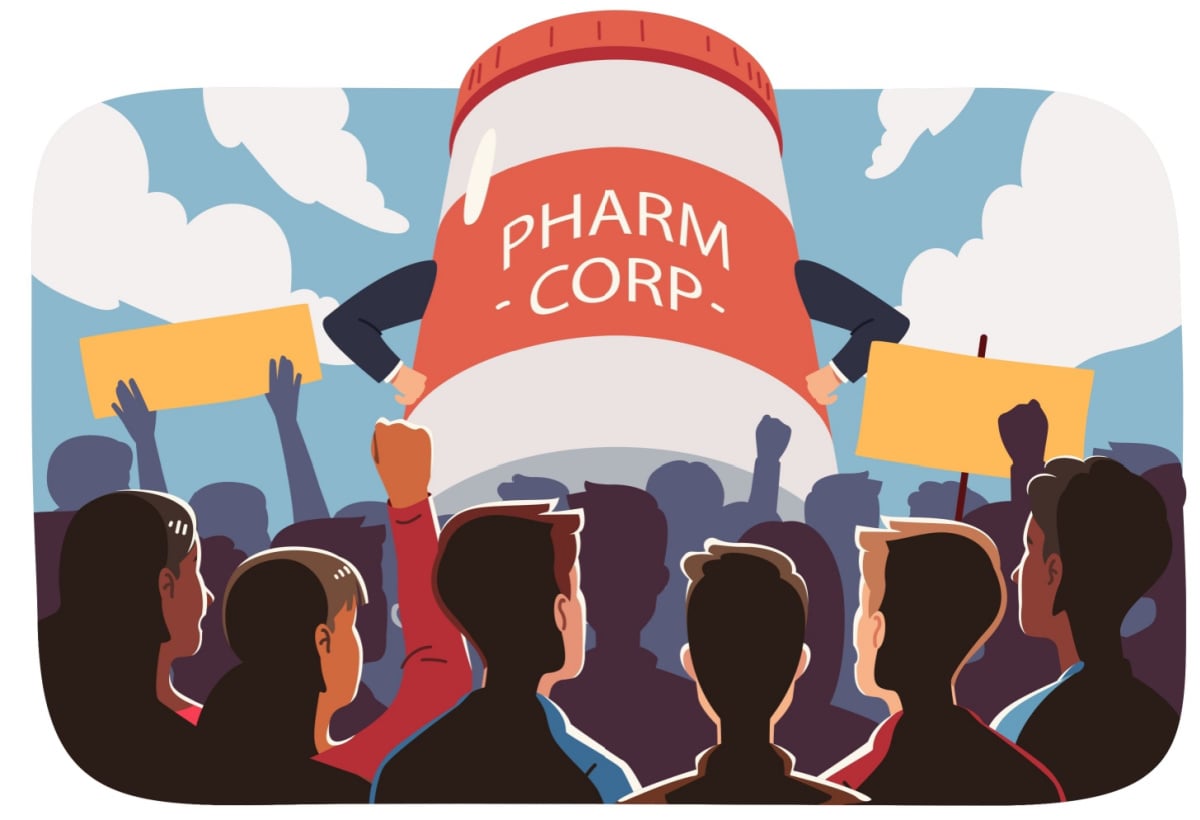Menopause marks the end of periods and fertility and is regarded as a natural part of aging. Occurring typically between the ages of 45 and 50, this period comes with a host of difficult symptoms due to the drop in hormone levels. However, a new drug could relieve some of these symptoms for millions of people.
One of the most common symptoms is hot flashes, with 80% of women in the U.S. predicted to experience hot flashes during the menopause transition, and 1.2 billion women worldwide by 2030. Yet, many remain untreated.
“Despite the impact menopausal symptoms may have on women’s health and quality of life, many go without treatment due to gaps in awareness, education, and limitations of treatment options available,” said a spokesperson from Bayer, the company developing elinzanetant, a drug to treat moderate to severe hot flashes (also known as vasomotor symptoms) associated with menopause.
Bayer’s elinzanetant awaits FDA approval for the treatment of menopause symptoms
Elinzanetant is the first of its kind. Unlike typical menopause medicines, which tend to be hormone therapy, it is the first dual neurokinin-1 and 3 (NK-1 and 3) receptor antagonist, in late-stage clinical development for the non-hormonal treatment of menopause symptoms.
It addresses these symptoms by modulating a group of estrogen-sensitive neurons in the hypothalamus region of the brain (the KNDy neurons). This is the part of the brain that manages body temperature, hunger and thirst, mood, sex drive, blood pressure, and sleep.
The estrogen fall leads to the dysregulation of body temperature as these neurons become enlarged, thereby disrupting mechanisms that control body heat, resulting in hot flashes.
“Menopause is a transitional phase in women’s lives, related to the progressive decline of ovarian function. It usually occurs in women during their 40s or early 50s but it can also be the result of surgical or medical treatment such as breast cancer treatment,” explained Bayer’s spokesperson.
“The hormonal decline can lead to various symptoms which can substantially affect a woman’s health, quality of life, healthcare utilization and work productivity. Every woman will experience menopause in a unique way. The most frequently reported and disruptive symptoms during the menopausal transition are vasomotor symptoms, sleep disturbances, and mood changes. Addressing these symptoms is key to maintaining functional ability and quality of life in menopause which is highly relevant from both a healthcare and socio-economic perspective.”
Bayer’s drug, developed by KaNDy Therapeutics prior to its buyout, blocks the activity of the brain cells in the hypothalamus that trigger these vasomotor symptoms as well as inhibits proteins NK1 and 3 to help improve mood and sleep. In phase 3 trials, which were called the OASIS trials, the drug met all its primary endpoints. It not only reduced the frequency and severity of hot flashes and improved sleep disturbances but also heightened quality of life compared to placebo.
The OASIS 1 and 2 multicenter studies were conducted over a span of 26 weeks in 96 and 400 postmenopausal women respectively, who were between 40 and 65 years across 184 sites in 15 countries. The OASIS 3 study tested elinzanetant in 628 postmenopausal women between 40 and 65 years across 83 sites in 9 countries over 52 weeks.
Findings from OASIS 1 and 2 were published in JAMA in August 2024. The OASIS 3 efficacy and additional long-term safety data were presented at The Menopause Society (TMS) annual meeting 2024. Now, the German pharma giant has submitted a New Drug Application with the U.S. Food and Drug Administration (FDA), and awaits market approval.
“The FDA submission for elinzanetant marks a significant milestone in our efforts to offer a new non-hormonal option for women and underlines our commitment to addressing the unmet medical needs of women globally,” said Bayer’s spokesperson. “Based on the data from OASIS 1,2 and 3, Bayer is continuing to submit applications for marketing authorizations of elinzanetant to further health authorities as well.”
Elinzanetant could even overshadow its rival non-hormonal drug Veozah, when it comes to improving sleep as it acts on both NK-3 and NK-1 receptors, which are associated with insomnia and mood.
Elinzanetant vs. Veozah: which will come out stronger for the treatment of symptoms associated with menopause?
Veozah, which is developed by Tokyo-based Astellas Pharma, was granted the FDA nod last year for the treatment of vasomotor symptoms linked to menopause in the U.S., and made available in the U.K. since January. Its approval was regarded as “game-changing” for hundreds of thousands of people for whom hormone replacement therapy (HRT) is not suitable. Like elinzanetant, the drug works in the hypothalamus, and is a NK3R antagonist that blocks NKB binding on the KNDy neuron to modulate neuronal activity to reduce hot flashes and night sweats.
Veozah’s approval was based on encouraging phase 3 results that measured the frequency of hot flashes, which were recorded to be 2.1 in the drug cohort and 2.6 on placebo at week four, and 2.6 and 2.5 at week 12 with the drug and placebo respectively.
If elinzanetant is cleared soon, the two drugs would go head-to-head in the market to treat menopausal symptoms that can have a significant impact on daily life. In fact, a 2022 U.S. survey revealed that four out of every 10 women reported that menopause symptoms have interfered with their work performance on a weekly basis. Moreover, a quarter of women felt that their menopause symptoms negatively impacted their career development or work-related opportunities, and 17% actually quit a job or considered quitting due to menopause symptoms.
Could repurposed drug rapamycin delay menopause?
While treatments to relieve these symptoms could change the lives of many and significantly improve quality of life, scientists have wondered whether delaying menopause could be worth a shot. Rapamycin is a drug that is hoped to bring this shift. Originally approved to prevent kidney rejection after transplantation, rapamycin is an immunosuppressant that targets a signaling molecule called mTOR, which controls cell growth and proliferation. Now, a team from Columbia University is repurposing the drug in the clinic to potentially stall menopause.
The study will find out whether the drug can prolong aging for the ovaries. The trial is being conducted in 50 healthy women between ages 38 and 45 years who have regular menstrual periods but are not interested in conceiving. Although the main goal is to check whether the drug could delay the onset of menopause, it might also offer clues for longevity more broadly.
The idea to repurpose the drug didn’t spring out of nowhere. Many years ago, its benefit was discovered when rapamycin was able to restore normal ovarian function in mice with premature ovarian failure and extend the reproductive lifespan in normal mice. It did so by suppressing the activation of the primordial follicles that contain immature eggs.
Now hailed a “paradigm shift” in the way menopause is studied, according to a report by The Guardian, early results of the human trial have found that the drug boosted health, memory, energy levels, and in the quality of their skin and hair in the participants. It is even predicted to slow ovarian aging by about 20%, according to Yousin Suh, reproductive aging researcher at Columbia University and one of the main researchers of the study. This corroborates other studies that suggest that the drug can revitalize organs that typically worsen in health with old age.
To add to that, the women who took the medicine continued to menstruate as normal, implying that the dosage is ideal and does not need to be altered.
Menopause care: medical gaps need to be filled
While these results are celebrated, it will be a while until we see the fruits of it, at least on a larger scale as a phase 2 study is set to take place after two years. And although more research is going into interventions for menopause and women’s healthcare, it is still a largely untapped therapeutic market. A report by Fierce Biotech suggested that there is a “huge business opportunity” as well as a “need to fill gaps in care and overcome medical barriers for the millions of women experiencing menopause.”
As two thirds of women aged between 40 and 64 in the U.S. claim that they’ve never talked about menopause with a health care provider and only one in five are referred to a menopause specialist, according to a survey conducted by the American Association of Retired Persons, medical aid seems out of reach for many.
However, while this calls for major reforms in the way menopause is handled medically, it is not all doom and gloom. More and more startups are cropping up like Oviva Therapeutics and Gameto, and wellness brands such as Bonafide Health – offering hormone-free supplements to alleviate symptoms – and Stripes, owned by British actress Naomi Watts, among others, to address the medical burden that is likely to come with menopause.
And, with the hopes of a green light for elinzanetant and clinical success for rapamycin, these would make strides in menopause research and raise the bar for therapeutic care for millions.























No Comments
Leave a comment Cancel